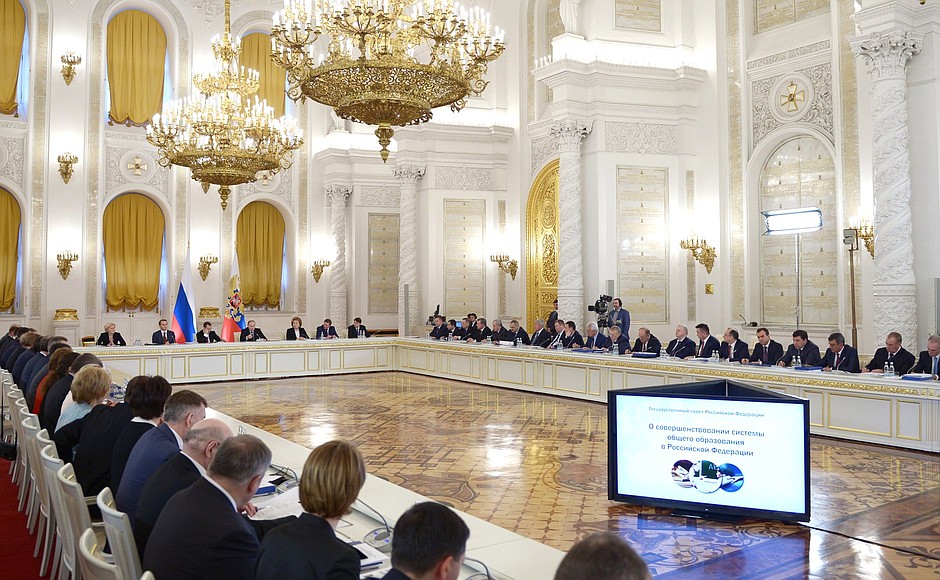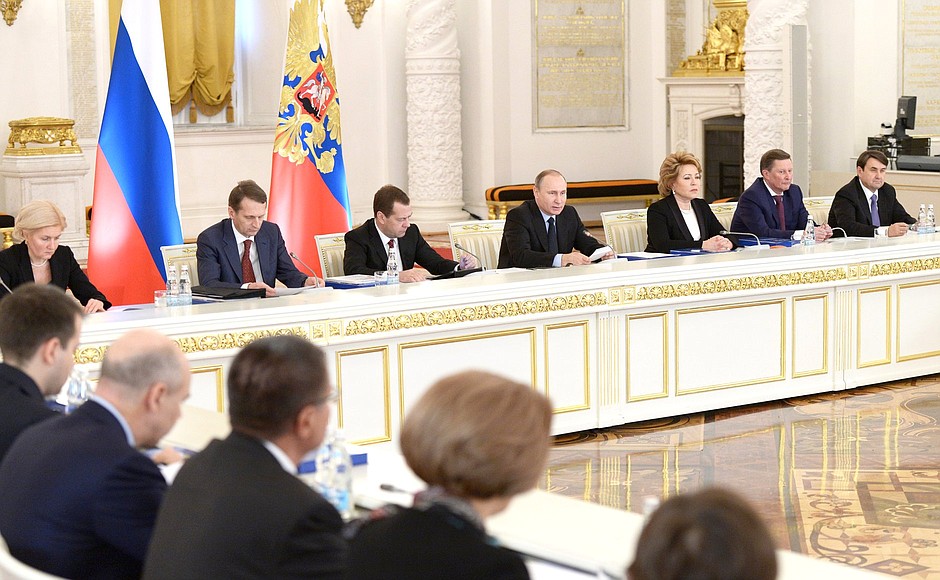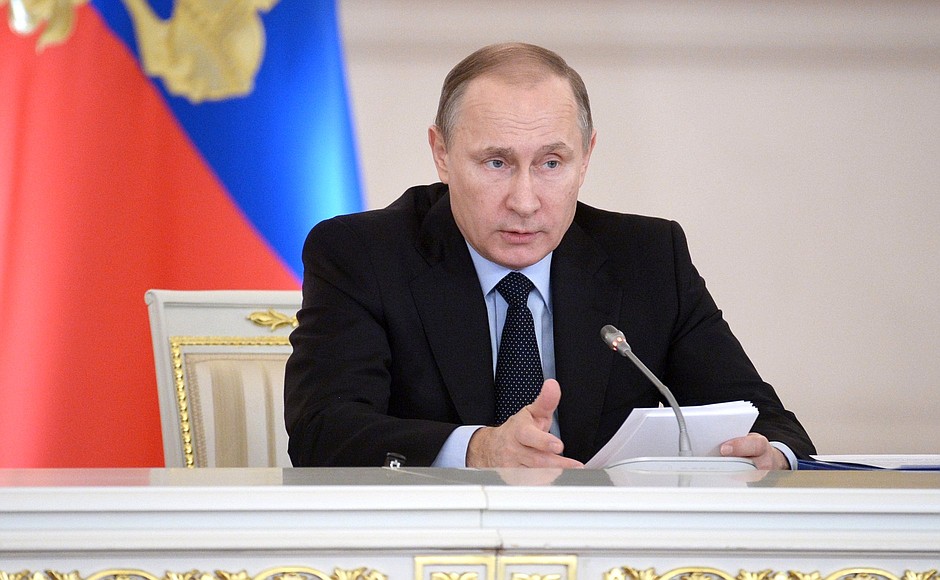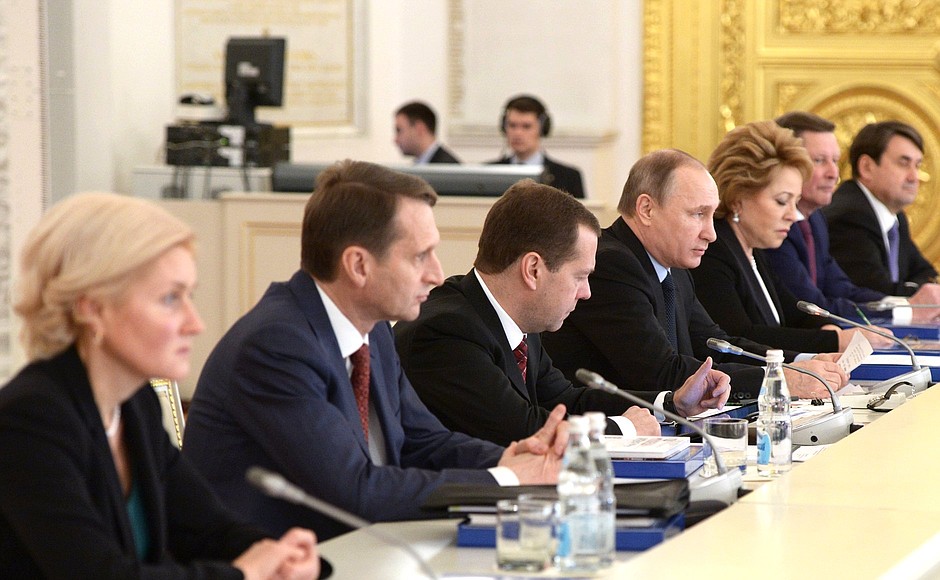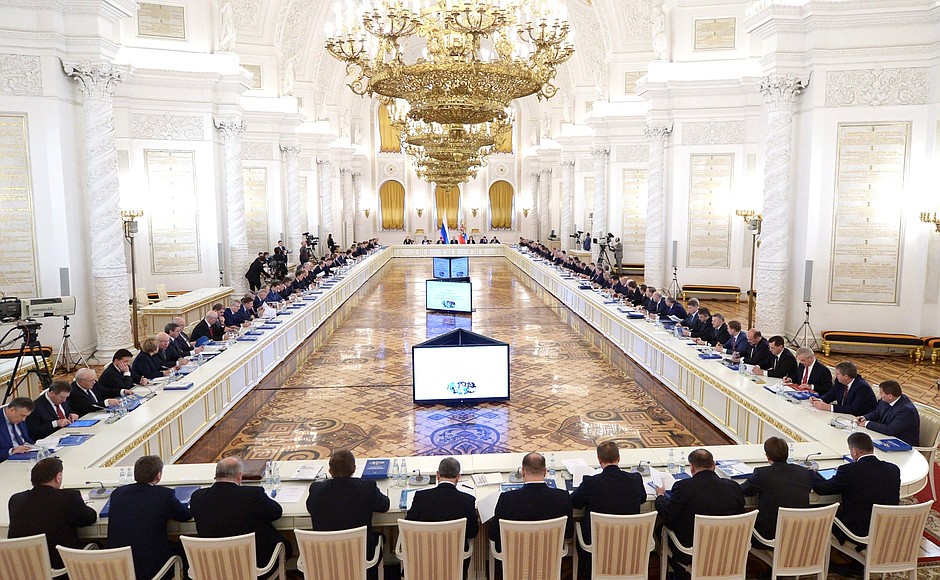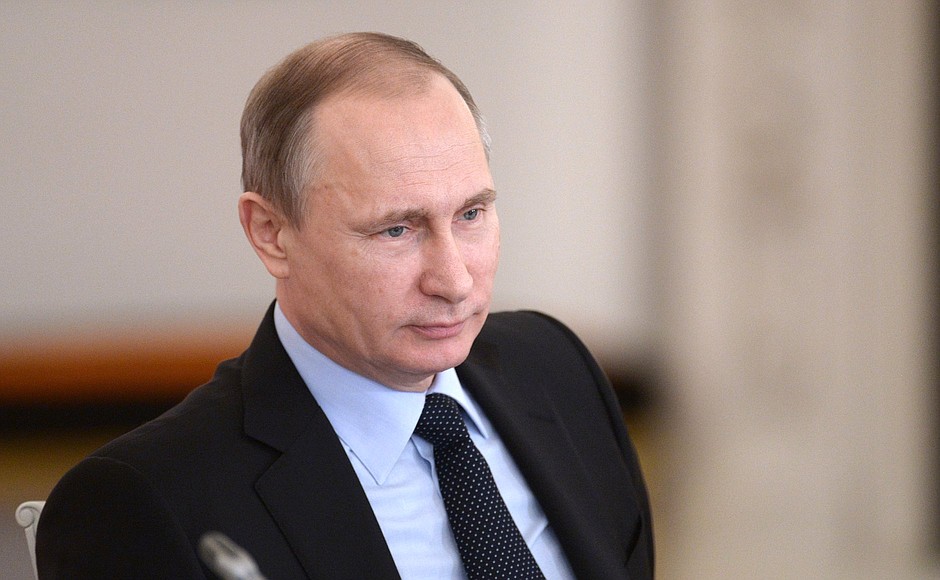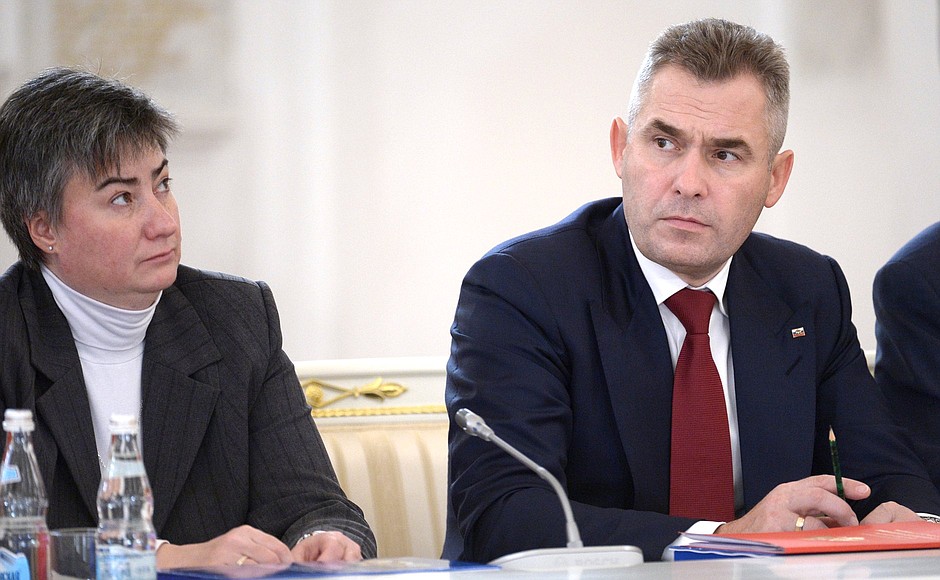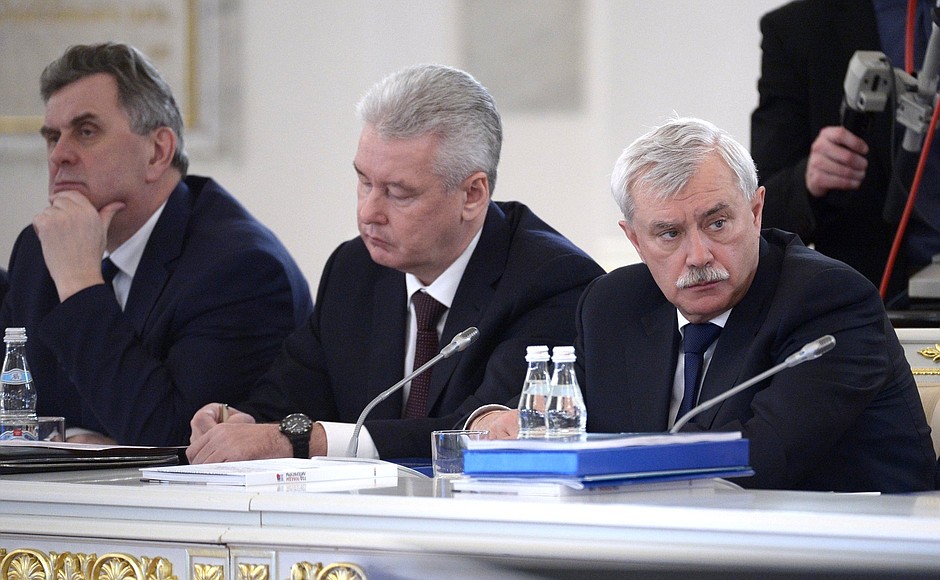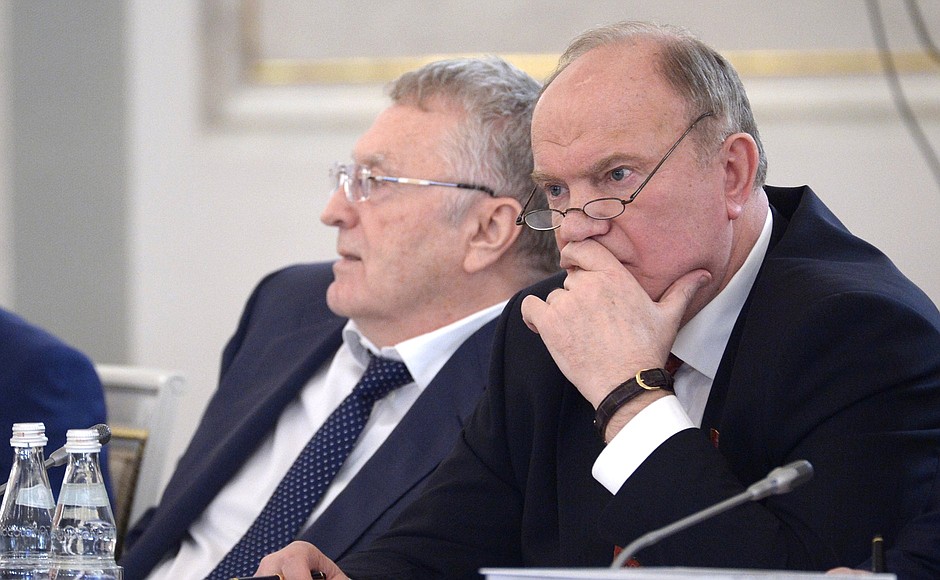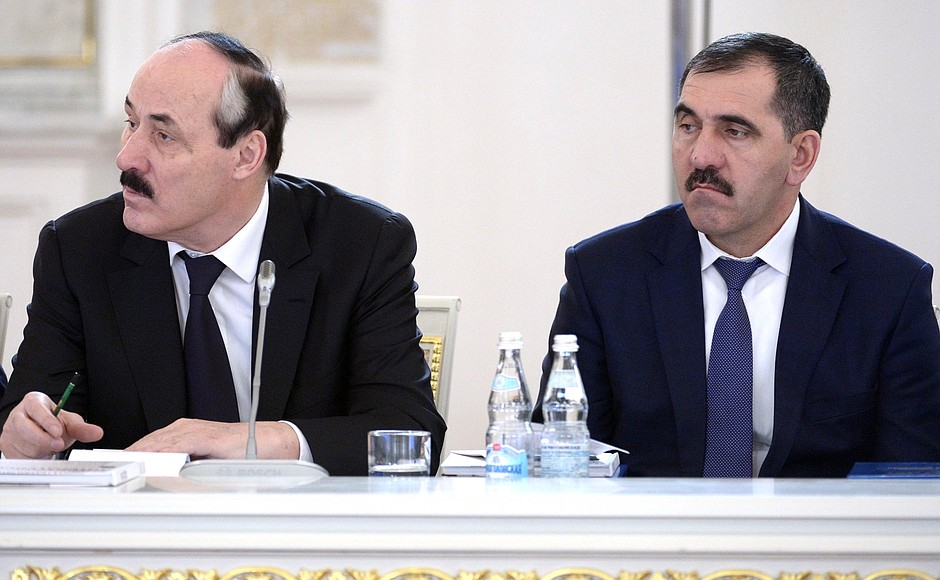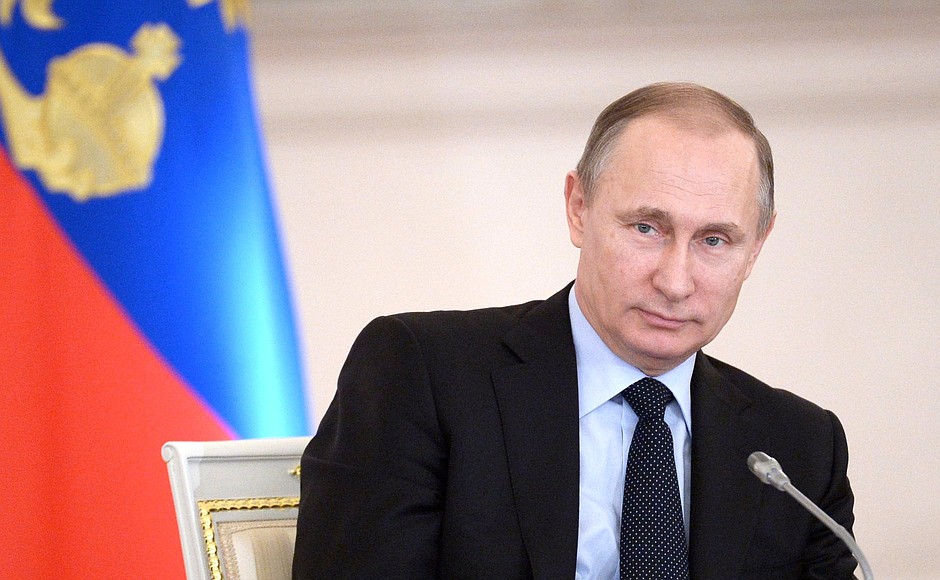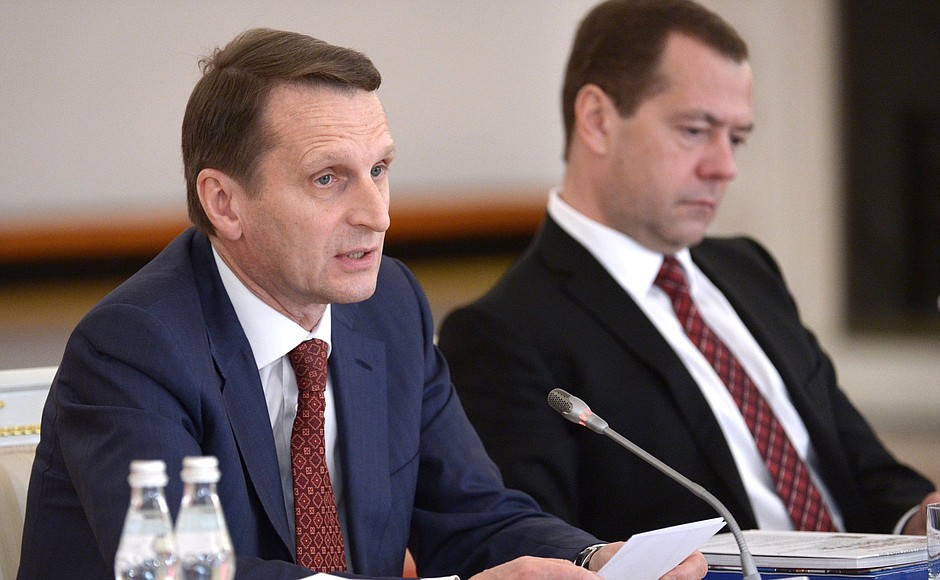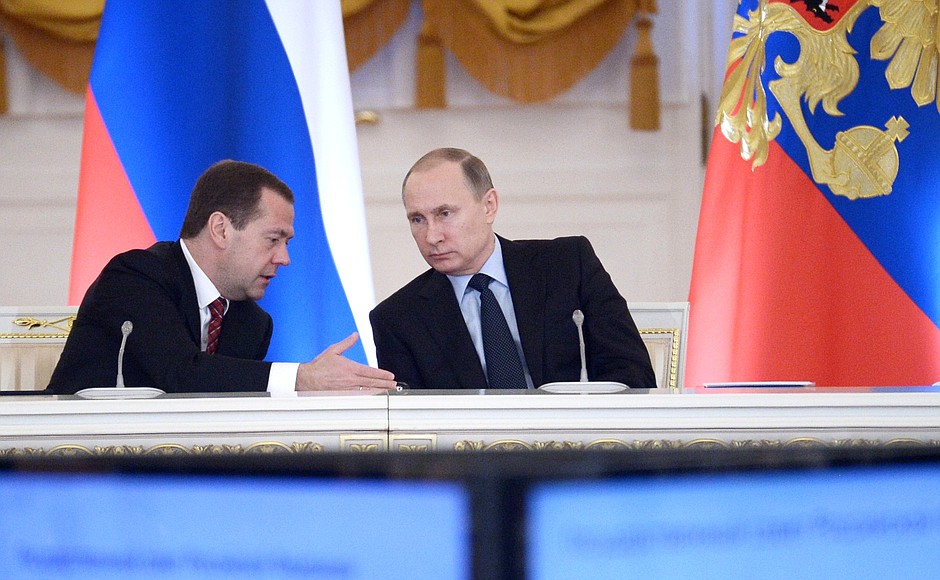President of Russia Vladimir Putin: Colleagues,
Today, together with regional heads and representatives of political parties, we will discuss one of the most important issues in our life – we will talk about the general education, our school system. I would like to remind you that special attention was also given to this topic in the Address to the Federal Assembly.
In early 2000s, we have identified human potential and human capital capacity building as one of our top priorities for the foreseeable future. A decade ago we launched the Education national project, which was followed by modernisation of the regional systems of general education in 2011–2013.
I would like to thank everyone who took the most active part in implementing our plans – pubic figures, teachers, school directors, representatives of political parties and movements. And, of course, the regional and municipal leaders – all your teams.
I know – and today we will definitely talk about it, – that we still have many unresolved issues, but the important thing is – and that is why we decided to discuss this issue today, – that we need to constantly get back to this topic, just like we do with healthcare. It should never take a back seat.
You know, it’s the same as with the ambulances: they had a meeting at one point, allocated money from the federal budget, their auto fleet and equipment were upgraded with the hope that we would regularly maintain the appropriate level and keep on moving forward, but then everything slumped. We cannot allow anything like this in healthcare or education. So we will discuss the problems.
But right now, I would like to note the positive changes that have occurred in the general education system as a result of the joint work we have carried out.
Ultimately, we were able to improve conditions for teaching children, and not just in large cities but in small towns and rural schools as well. Today, nearly all Russian schools are connected to the internet. I recall when we began this programme, it seemed the money was enormous and we would never achieve this given our huge territory – but ultimately, we were successful.
Schools now have modern equipment and gyms. The teaching profession is once again becoming respected and prestigious, attractive and interesting to young professionals.
Educators’ salaries have increased significantly. There is increasing competition to get accepted into teaching departments at colleges. The May 2012 executive orders set the objective of ensuring that average teacher salaries are comparable to the average salaries across our economy.
I want to once again say something I have repeated many times. Of course, I know the arguments that if the teachers are being paid an average salary, this should be extended to just about everyone. All our professions deserve respect, and society should respect and care for all working individuals.
But ultimately, there are some fundamental issues, and one of them is education, school education. All of us, without exception, want our children to be better than us. And to do this, we need to provide them with a corresponding level of training at school.
In order for this to happen, we must continue giving our attention to teachers. And now, this level – the national average salary for teachers – has become a legal provision. It needs to be carried out, in spite of any difficulties, even objective ones. Because if we do not take positive steps in fundamental areas, we will never see changes for the better. I want to point this out to our colleagues from the Russian federal constituent entities.
Friends, I think that we can set a new level and a new scale of development for the next decade, to make Russian schools among the best in the world. I am confident that this objective is achievable and should unite all the political forces, all levels of government and citizens in our nation. It speaks to the demands of our society and our national development objectives. It is important to determine the most effective, actionable instruments for implementing our plans together.
Of course, we must take into account the global development trends, i.e., the practically explosive development of technologies and transition to a new technological order. And schools should also walk step in step with the times, and be ahead of the times in some areas, to prepare our children for a dynamic, fast-paced life, teach them to master new knowledge and know-how and to think freely and creatively. To do this, we need an effective mechanism for constantly updating the content of Russian education.
However, we cannot forget the fundamental, constant things – the humanitarian and pedagogic component. It is important to preserve the cultural heritage of the peoples of Russia and pass it on to new generations: the history, Russian language, great Russian literature, the languages of the peoples of Russia, and our achievements in the humanities. That is the strength of our country, the ability of our nation to respond to any challenge, and moral education is no less significant than teaching and preparing professionals for the new economy.
At all times, the work of the teacher has been at the foundation of school education. Today, the requirements to this profession have increased significantly. Creating worthy motivation for teachers, conditions for their constant self-improvement, for raising their qualifications, is currently becoming a key factor in developing the entire system of general education. In this respect, I suggest creating a nationwide system for teachers’ professional development. And here, I would like to specify several areas.
First is implementing modern programmes for teachers’ training and professional development that correspond to professional requirements. We need to broaden participation in this work by universities and research institutions, and take advantage of the unique experience of the nation’s best teachers and leading schools. And, of course, it is imperative to utilise resources from our recently created Sirius Centre for Supporting Talented Children; it should also become a source of cutting-edge teaching practices.
Second is implementing an effective mechanism for material and moral incentives for high-quality, creative teaching, creating incentives for development and constant professional growth. You know, teachers are now given titles and categories, and there are monetary bonuses in place for this. But in essence, this system has largely lost its incentivising role.
A person achieves a certain level of success, reaches a new professional level and stops, while perceiving the bonuses as simply part of his or her salary. It is imperative for teachers to prove from time to time their right to additional bonuses and their professional status. In this case, a teacher gets the motivation to acquire new knowledge and know-how.
Third, it is clear that we should improve the system of qualifications assessment, the quality of a teacher’s performance and his or her potential, to make it more objective and less bureaucratic. And the main assessment should come not from the bureaucrat but from a teacher’s colleagues and professional community.
And another issue. Each of us had teachers who truly became our mentors; they not only inspired our love for a subject they taught, but also helped us set our goals, taught us the most important moral principles and largely determined our future. Each of us is certainly grateful to such teachers, and we will be grateful to them for the rest of our lives. Each of us sincerely feels that these educators are worthy of the highest titles and awards.
Modern information technologies allow us to create mechanisms for assessing the teachers’ work, including on the basis of opinions from graduates, those who have already entered adult life and can provide a truly deserved, fair assessment to school mentors with the wisdom of hindsight. I am asking the Cabinet to develop and implement a nationwide system for teachers’ professional development.
I will add that Russia is known not only for its teachers; we have always had outstanding educational administrators and school directors in Moscow and other cities across the nation. They created truly strong high schools with a special atmosphere and a talented teaching staff.
I feel that we must seriously renew and improve the system of selection and professional development for school directors, so that the school attracts bright young professionals who are engaged in their field. This positive process, which we are already seeing, should absolutely be supported.
Moreover, I suggest reducing the administrative and paperwork burden on teachers and educational organisations overall as much as possible. The State Council working group suggests that school administrators primarily take on the bureaucratic and accounting work. In most cases, these are municipal and regional government organisations. I fully agree with this suggestion from our colleagues in the working group.
We should also streamline the amount of supervisory activities in relation to schools. Corresponding decisions must be made as quickly as possible. Clearly, in this area, where we are talking about children’s lives and health, it is imperative to have strict monitoring, but we need to organise it so as not to impede teachers from doing their main work, teaching children.
Colleagues, we will continue work to create comfortable conditions for education. Next year, 50 billion rubles will be allocated from the federal budget toward school construction, renovation and rebuilding. I would like to point out that this is a regional and municipal issue; it is primarily the responsibility of the regions and municipalities. We are allocating these resources from the federal budget.
Incidentally, this does not mean this funding should replace regional funding. Absolutely not. The regions already have funding allocated for schools and school affairs, and it should still be used.
In the coming years, we should eliminate the third shift at schools, and then we should ensure that students – at least in the elementary and high school – study in only one shift.
I also want to draw the regional leaders’ attention to the need for providing common social guarantees to children, regardless of the form of ownership of a school where a child is studying, be it federal, regional, municipal, or private school. First and foremost, this is about subsidised school meals for children with disabilities or children from large or low-income families.
At the same time, I repeat, our goal is much broader: to create a truly modern educational environment, including for children with disabilities. It is imperative to fully use the advantages of information technologies and distance learning.
I support the State Council working group’s proposal to create a universally accessible electronic school for every student in the nation, providing educational materials and lectures from our famous educators and scientists, so that students and teachers have the opportunity to use the most modern information resources and educational programmes. And to do this, I am asking you to work on providing Internet connection to general education institutions more quickly.
Furthermore, it is important to help children consciously choose a profession that will be needed in the labour market while they are still in school, so that they can later find their path in life, get a decent salary and fulfil themselves. Of course, professional training for schoolchildren, their professional orientation, should not be a formality. That is precisely why our fundamental objective is to engage a wide variety of players in this work – not just universities or technical schools, but also businesses, first and foremost large and medium-sized businesses.
If an entrepreneur is thinking long-term, forming a long-term development strategy, he or she should actively cooperate with a school. This is not just an investment of funds into constructing new facilities, although that, too, is very important. Incidentally, we have very good examples where businesses invest money into developing schools, into building schools, equipping schools in Moscow and other regions. I would like to use this opportunity, I know many talented people personally, and I want to thank all of them for doing this. I hope that they will not stop there, and more of their colleagues from the business community will get involved in this movement. But that, too, is not enough. We need to talk about companies, create laboratories, organise clubs and extracurricular activities, and build educational complexes.
I propose that our business organisations join the regions in thinking about organising cooperation with schools on a systemic basis. Incidentally, the creation of the first children’s industrial park has been a successful example of this cooperation. They have already begun operating in Khanty-Mansiysk and Nefteyugansk, and plans are in place on Naberezhnye Chelny and several other cities in our nation.
Overall, we need to continue developing additional education, technical clubs, creative studios and sports clubs. We must improve the system for seeking out and supporting gifted children. But, of course, we need to support everyone. And naturally, museums, theatres, libraries and public projects in patriotic education, as well as various volunteer movements, should be an essential part of the modern educational environment.
Colleagues, it is clear that to implement our plans, we need serious resources, while what’s most important is the efficiency of management decisions, first and foremost at the regional government level, which is responsible for education. It is imperative to also have participation by citizens, political parties, businesses, as I already said, and the teaching community.
I want to thank you for your attention and conclude my opening remarks here. Let’s discuss all these problems, which, as I said at the beginning, should be subject to our constant attention.
<…>
Colleagues, the topic we have discussed is certainly a key one. Various aspects of this complex issue were touched upon here, and not a single one of the problem areas identified is of secondary nature. Everything is important – foreign languages, the languages of the peoples of Russia and support for Russian ethnic groups’ literature, because it enriches everything.
It is enough to recall Rasul Gamzatov from Daghestan to understand how he enriched Russian culture and literature. But certainly without Gamzatov being translated into Russian or without his writing in Russian, no one would ever remember Daghestan. So, of course, the significance of the Russian language is on-going.
Construction, the Internet, distance learning and moral education are all important as well. I repeat, there is not a single issue raised that is secondary.
I will not comment on your speeches now. I want to say that we will try to take everything that was said here into account as much as possible, and I want to thank you for how much you care about this topic.
Today, during our discussion, it was noted that this topic is of interest to everyone, everyone wants to make their input not only to the discussion but also to resolving the challenges we face. I will ask you to preserve your passion for this topic and work continuously to achieve the objectives we discussed today.
Thank you very much.
I want to congratulate the State Duma deputies on the completion of their session and wish everyone a happy New Year.
